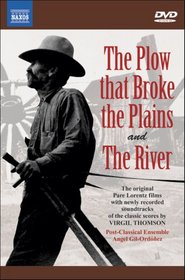| Actors: Virgil Thomson, Post-Classical Ensemble, Angel Gil-Ordonez Genres: Drama, Musicals & Performing Arts Sub-Genres: Drama, Classical Studio: NAXOS Format: DVD - Black and White DVD Release Date: 01/30/2007 Theatrical Release Date: 01/01/1935 Release Year: 2007 Run Time: 1hr 52min Screens: Black and White Number of Discs: 1 SwapaDVD Credits: 1 Total Copies: 0 Members Wishing: 1 Edition: Classical MPAA Rating: Unrated Languages: English |
Search - The Plow That Broke the Plains & The River / Gil-Ordonez, Post-Classical Ensemble on DVD
  | The Plow That Broke the Plains The River / Gil-Ordonez Post-Classical Ensemble Actors: Virgil Thomson, Post-Classical Ensemble, Angel Gil-Ordonez Genres: Drama, Musicals & Performing Arts UR 2007 1hr 52min Pare Lorentz's The Plow that Broke the Plains (1936) and The River (1937) are landmark American documentary films. Aesthetically, they break new ground in seamlessly marrying pictorial imagery, symphonic music, and poetic ... more » |
Larger Image |
Movie DetailsSimilar Movies
|
Movie ReviewsTwo Masterpieces of Documentary Film Restored with Newly Rec J Scott Morrison | Middlebury VT, USA | 02/01/2007 (5 out of 5 stars) "Pare Lorentz's two groundbreaking 1930s documentaries, paid for by the US government and making no apologies for their propagandist intentions, are here presented with the evocative scores by composer Virgil Thomson played in modern sound by the Post-Classical Ensemble with Angel Gil-Ordóñez conducting. There are unnerving modern resonances in these two films, one about the plow's partial destruction of the great plains that led to the Dust Bowl (reminding us of the modern near-depletion of the Ogalalla aquifer in that same area), and the other about upstream flood control containment by dikes and levees of the Mississipi for 1000 miles of its length, touted as a great marvel of man's taming of Nature but as we now know contributing to such things as the awful destruction wrought by Hurricane Katrina. The black-and-white films themselves are visually beautiful. The cameramen sent to photograph scenes used in the film included such luminaries as Paul Strand. The narration, written by Lorentz, is poetic. Thomson's music is simple-sounding and triadic in the extreme, making use as it does of such tunes as the Doxology ('Praise God From Whom All Blessings Flow', scored differently and aptly at different points in 'The Plow') and 'Go Tell Aunt Rhody.' And it is both esthetically and emotionally satisfying. The DVD makes use of a modern re-recording of Thomson's scores, and the new recording of the original voice-over narration is nicely done by Floyd King. There is, however, the option to play both films with the original scores' 1930s soundtrack music conducted by Alexander Smallens. We also get a couple of interviews with George Stoney, later himself a distinguished documentarian but in the 1930s a PR person for the government; he showed the films to groups of citizens in the Southeast and recalls many details about the films' origins and their initial reception. Joseph Horowitz talks with composer Charles Fussell, a student of Thomson's, about the scores. (It might be noted that there has been a recent CD on the Albany label that presents both Thomson's and Fussell's cello concertos, and very nicely done, too.) There is a 1979 audio-only interview with the late Virgil Thomson in which he talks about the two films and about film-scoring in general. I had been familiar with the scores of these two films for many years. As I grew up in the Dust Bowl area, I remember many stories of that awful period and had been particularly interested to see 'The Plow'. (As a small bit of irony, I now live in the Vermont town where the inventor of that plow, John Deere, learned the blacksmithing trade.) I must say that I was thrilled with both films. These are important documents restored to their original luster. Enthusiastically recommended. Scott Morrison" Apocalypse Then David H. Vonseggern | 05/16/2007 (4 out of 5 stars) "These stark and dark films are accounts of the land misuse which led to two of the nation's greatest environmental disasters. I found "The Plow That Broke the Plains" especially riveting. The black and white presentation further lends barrenness to these accounts and focuses the viewer more closely on the mechanized devastation. The films demonstrate to what extent the federal government involved itself in national environmental crises in the 1930's, an involvement which may not be possible to repeat today in spite of a much higher environmental awareness across the population. Conservationists, environmentalists, and political historians should enjoy and learn from these documentary films." Two American Classics Michael R. Rhodes | Channel Islands Harbor, CA | 03/21/2007 (5 out of 5 stars) "Film Schools regard these Lorentz documentaries right up there with Flaherty. Must see! Must hear! The score is fantastic!" The Plow That Broke the Plains & The River F. S. Tanner | Sutherland Ne. | 08/05/2007 (5 out of 5 stars) "This complemented "The worst of hard Times Book" which helped me under stand how I was raised In Nebraska,
the reason for Social Security and the Path Our country has followed. Our parents and ancestors had it rough but perseved." |






